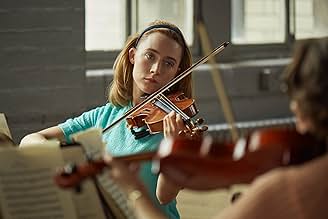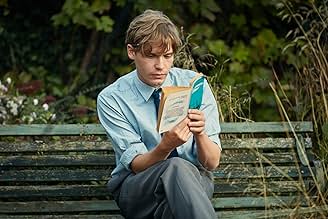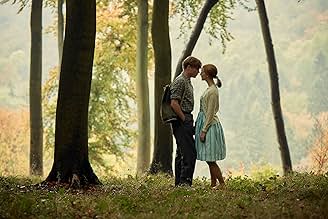Nell'Inghilterra del 1962, una giovane coppia scopre che la loro storia d'amore idilliaca si scontra con questioni di libertà sessuale e pressione sociale, portando a una notte di nozze imba... Leggi tuttoNell'Inghilterra del 1962, una giovane coppia scopre che la loro storia d'amore idilliaca si scontra con questioni di libertà sessuale e pressione sociale, portando a una notte di nozze imbarazzante e fatidica.Nell'Inghilterra del 1962, una giovane coppia scopre che la loro storia d'amore idilliaca si scontra con questioni di libertà sessuale e pressione sociale, portando a una notte di nozze imbarazzante e fatidica.
Recensioni in evidenza
The lead-up to their union is squirm-inducing to watch: a silent silver-service meal in their room; incompetent fumbling with zippers; shoes that refuse to come off. To prolong the agony for the viewer, we work through flashbacks of their first meeting at Oxford University and their disfunctional family lives: for Florence a bullying father and mother (Samuel West and Emily Watson) and for Edward a loving but stressed father (TV regular, Adrian Scarborough) but mentally impaired mother (Anne-Marie Duff, "Suffragette", "Before I Go To Sleep").
As Ian McEwan is known to do (as per the end of "Atonement" for example), there are a couple of clever "Oh My God" twists in the tale: one merely hinted at in flashback; another involving a record-buying child that is also unresolved but begs a massive question.
The first half of the film is undoubtedly better than the last: while the screenplay is going for the "if only" twist of films like "Sliding Doors" and "La La Land", the film over-stretches with some dodgy make-up where alternative actors would have been a far better choice. The ending still had the power to move me though.
Saoirse Ronan is magnificent: I don't think I've seen the young Irish-American in a film I didn't enjoy. Here she is back with a McEwan adaptation again and bleeds discomfort with every line of her face. Her desperate longing to talk to someone - such as the kindly probing vicar - is constantly counteracted by her shame and embarassment. Howle also holds his own well (no pun intended) but when up against the acting tour de force of Ronan he is always going to appear in second place.
A brave performance comes from Anne-Marie Duff who shines as the mentally wayward mother. The flashback where we see how she came to be that way is wholly predicatable but still manages to shock. And Duff is part of a strong ensemble cast who all do their bit.
Another star of the show for me is the photography by Sean Bobbitt ("12 Years a Slave") which portrays the windswept Dorset beach beautifully but manages to get the frame close and claustrophobic when it needs to be. Wide panoramas with characters barely on the left and right of the frame will play havoc with DVD ratios on TV, but work superbly on the big screen.
Directed by stage-director Dominic Cooke, in his movie-directing debut, this is a brave story to try to move from page to screen and while it is not without faults it is a ball-achingly sad tale that moved me. Recommended if you enjoyed the similarly sad tale of "Atonement".
Florence Pointing and Edward Mayhew have just been married and have arrived at a hotel at the titular beach for their honeymoon. Through an uncomfortable dinner in their room and awkward fumblings with their clothes, it becomes painfully clear that they are equally inexperienced and nervous regarding sex. As the evening slowly progresses, we see flashbacks of how their romance developed, with hints at what makes the prospect of sleeping together so uncomfortable for them - especially Florence. When things come to a head, the young marrieds have a seaside conservation which reveals much about who they are (and the era in which they live) and has very important consequences for the rest of their lives.
"On Chesil Beach" is one of the most layered and most profound movies you are likely to see in 2018. Woven in with the development of the romance, the developments on the wedding night and the repercussions of all of it are themes of sexual repression, gender roles, class differences, pride, regret, communication, forgiveness and, of course, love and marriage. Some will say that not much happens in this film, but there is still a whole lot happenING. And through it all, the considerable acting chops of the two leads (bolstered by solid performances from multiple Oscar nominee Emily Watson, Anne-Marie Duff, Samuel West, Adrian Scarborough and Bebe Cave) make the characters exceedingly sympathetic and relevant. This is a very well-done film without much action, but with plenty to show all of us. "A-"
There then follows a series of flashbacks, not in chronological order, as the attempt to consummate the marriage continues. They first met at a CND meeting in Oxford, Edward wandered in literally by accident but it was love at first sight. Not at all corny, you can literally see Cupid's Arrows crossing the room. Florence offers Edward a booklet on the likely results of a H-Bomb hitting Oxford, Edward says it sounds like a good idea.
Florence has a first in Music from Oxford, Edward's first is in History from UCL This makes Florence's mother Violet (Emily Watson) wonder if his parents are from a tradesman background and her factory owner father Geoffrey (Samuel West) is equally snobby albeit in a more restrained manner. Edward's father Lionel (Adrian Scarborough) is an engineer and his mother Marjorie (Anne-Marie Duff) is an artist but suffers from an acquired brain injury and is prone to acting unpredictably.
There is some good acting especially by Anne-Marie Duff but the thespians are hampered by a screenplay which hasn't been fully translated from novel to film, even though novelist Ian McEwan has written the adaptation. The chopped up nature of the flashbacks in this instance also hamper the development of a coherent narrative. This is still a touching story of love blighted by inexperience with some dark secrets also implied in the background. 7/10.
Lo sapevi?
- QuizExecutive Producer, Author, and Screenwriter Ian McEwan stated to an audience back in 2014 that he wanted Saoirse Ronan to play Florence Ponting.
- BlooperIn the tennis match between Edward and Florence's father (Geoffrey), they're either counting the games wrong or not alternating service properly. Edward begins serving at the start of the third set, so he should be serving when the game score is even. We immediately jump forward to a later game in which Geoffrey is serving. Geoffrey loses the game (for a change), and Edward announces the score as 1-4 before serving, which means he is now serving when the game score is odd.
It's also slightly off that Geoffrey starts serving the first set, and then Geoffrey begins serving the third set after 12 games. This, however, could simply be the result of Geoffrey letting Edward begin serving the third set, out-of-order and out of strict compliance with the rules, as a sop after beating him 6-0, 6-0 in the first two sets.
- Citazioni
Florence Ponting: [during foreplay] Say something. No, say something stupid like you used to.
Edward Mayhew: Miss Ponting, you have a clavicle and a philtrum that all men wish to play on, and a vibrato that all men adore, but you're entirely mine, and I'm so very glad and proud.
Florence Ponting: In that case, you may kiss my vibrato.
- ConnessioniFeatures Sapore di miele (1961)
I più visti
Saoirse Ronan Through the Years
Saoirse Ronan Through the Years
- How long is On Chesil Beach?Powered by Alexa
Dettagli
- Data di uscita
- Paese di origine
- Sito ufficiale
- Lingua
- Celebre anche come
- On Chesil Beach
- Luoghi delle riprese
- Aziende produttrici
- Vedi altri crediti dell’azienda su IMDbPro
Botteghino
- Lordo Stati Uniti e Canada
- 745.971 USD
- Fine settimana di apertura Stati Uniti e Canada
- 35.765 USD
- 20 mag 2018
- Lordo in tutto il mondo
- 3.338.249 USD
- Tempo di esecuzione1 ora 50 minuti
- Colore
- Proporzioni
- 2.39 : 1
Contribuisci a questa pagina






































